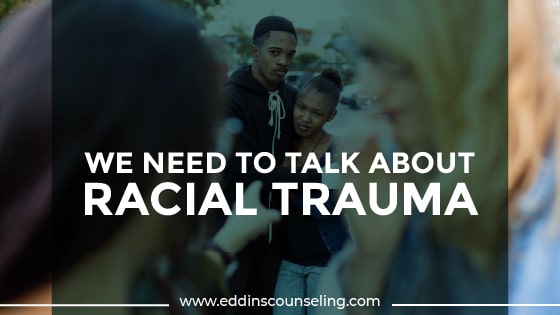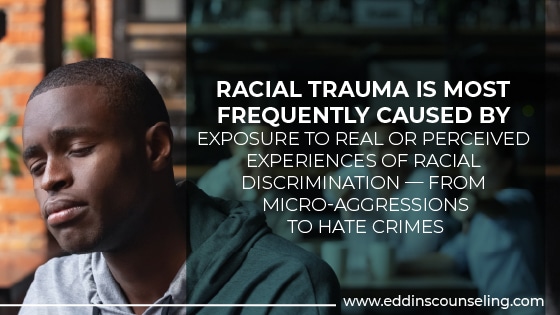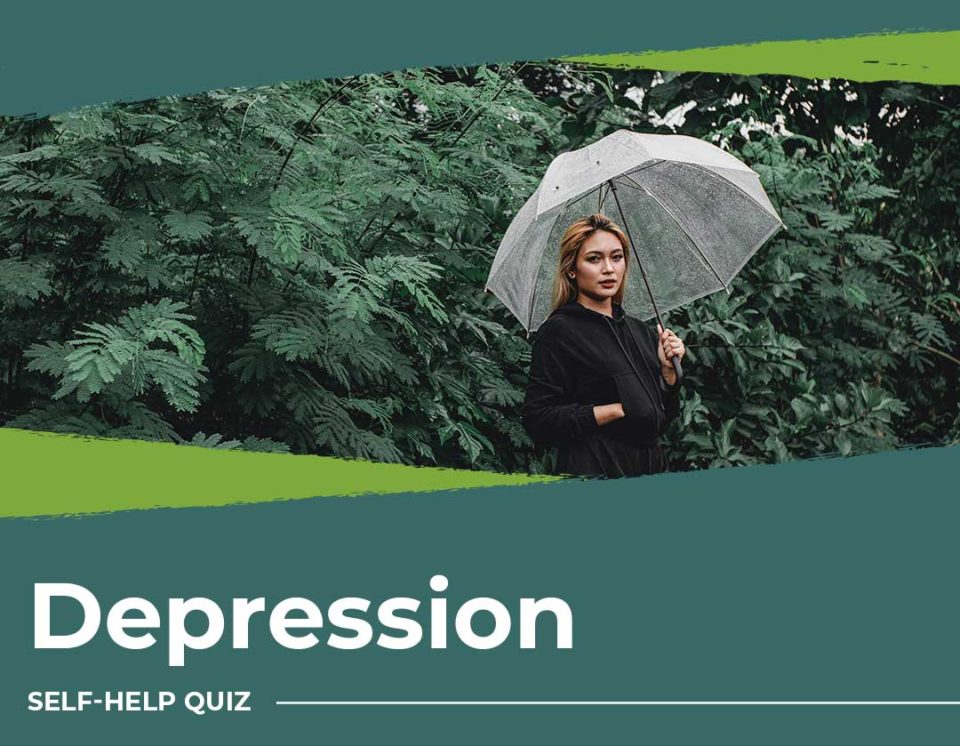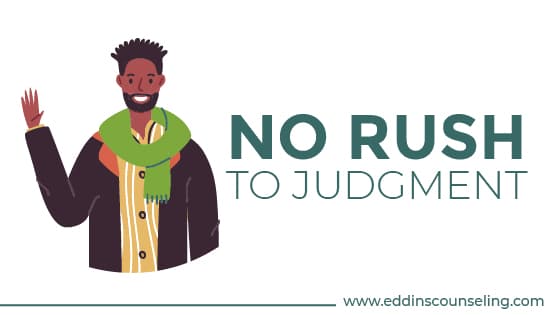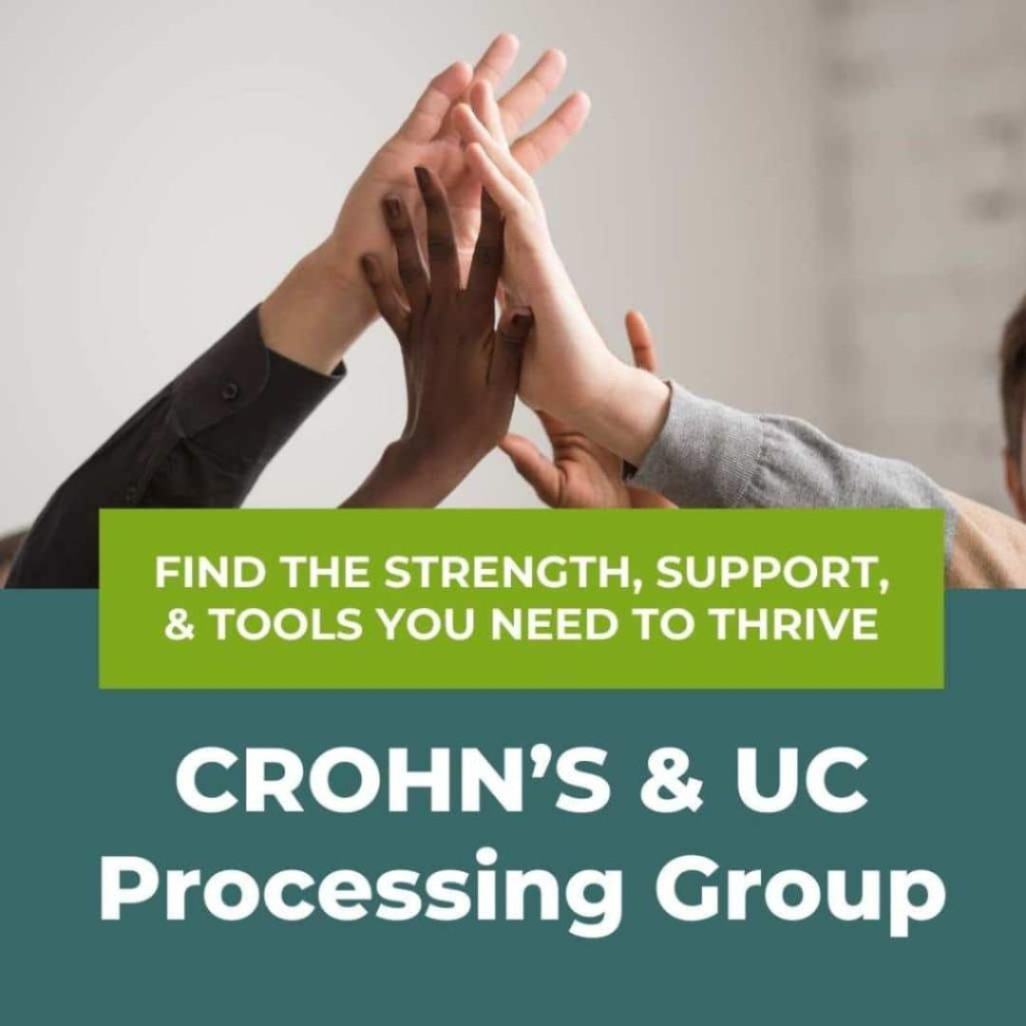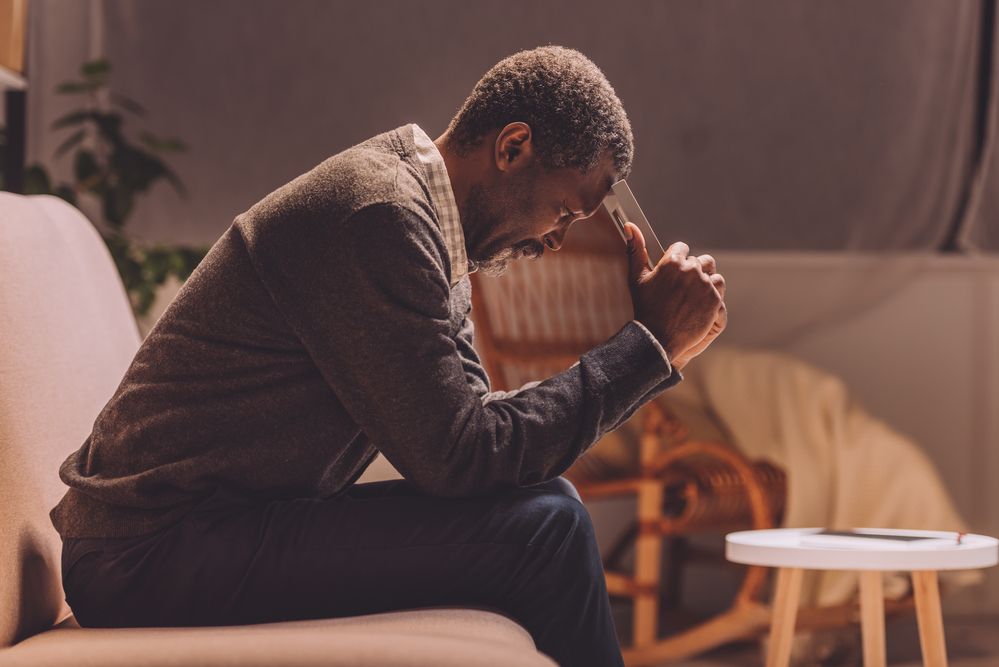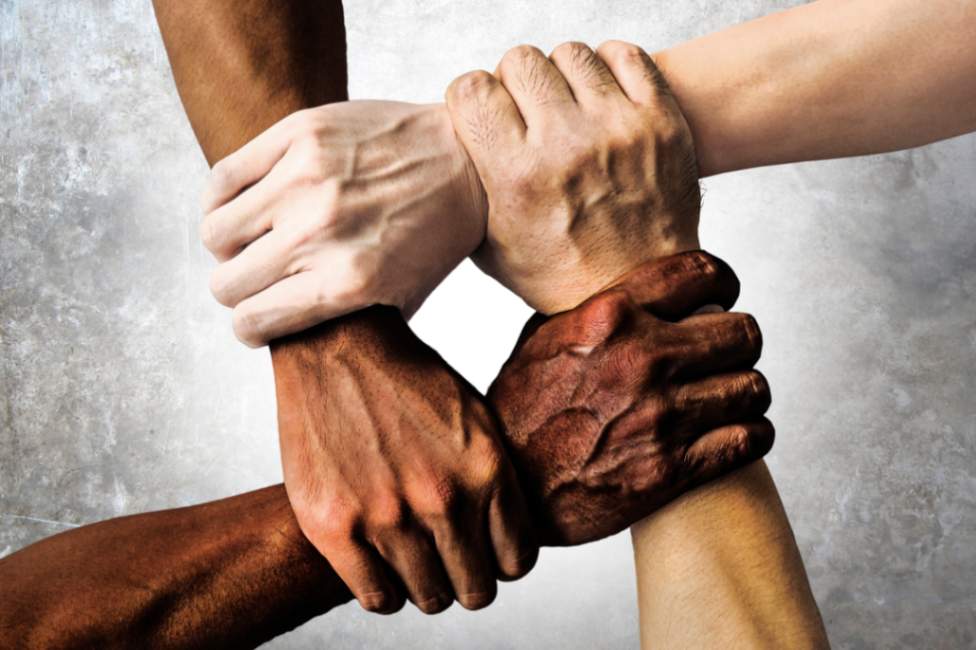January 25, 2021
We Need to Talk About Racial Trauma
Written by Sara Lane
Posted in Emotional & Mental Health, LGBTQ + Multicultural Concerns, Trauma, Grief & Loss and with tags: racial trauma
To state the obvious: 2020 has been a year of much racial turmoil and reckoning.
We have all been introduced or reintroduced to a wide range of terms of concepts.
Jarring, and debated among us, has been rhetoric, including “white supremacy, privilege, and fragility—opinions about systemic racism, critical race theory, and reconciliation swirl through the headlines.
In fact, “racial trauma” is another term you can add to the list. Racial trauma is relatively easy to define.
But to you, it may feel so difficult to sort out the impact on your heart and mind. Unfortunately, it’s often difficult to receive a diagnosis, meaningful treatment, and a coping plan.
Much of the nation is struggling to recalibrate its perception of race and racism, and this awakening is also happening within the realm of psychotherapy. Even the president of the American Psychological Association declared earlier this year that “We are living in a racism pandemic.”
Yet, while some crucial societal conversations are happening, we cannot lose sight of how real-life individuals are impacted by racism.
It’s true, and we are living in a time of racial reckoning. However, this long-overdue awareness must not overshadow the reality of racial trauma. If you are a person of color, you may have become so acquainted with race-based stress that you may not even recognize it as trauma.
The truth is, the fallout of racial trauma is not unlike that of Post-Traumatic Stress Disorder (PTSD).
But unlike people living with PTSD, People of Color (POC) live with the ever-present fear that the mere color of their skin may trigger more suffering.
What is Racial Trauma?
Racial trauma is a form of racially-based stress. It is not unlike Post-Traumatic Stress Disorder (PTSD) but is specific to people of color (POC).
Racial trauma is most frequently caused by exposure to real or perceived racial discrimination experiences — from micro-aggressions to hate crimes. Health professionals must understand what causes racial trauma.
From there, they can help a client evade ineffective coping mechanisms and move toward healthier forms of healing. This may very much depend on each individual.
However, there are some general categories of events and episodes known to cause racial trauma.
For example, some traumatic events that cause racial trauma include:
- Events that humiliate POC
- Shaming of POC
- Being targeted for abuse or discrimination
- Witnessing racial discrimination
- Enduring threats against oneself or other POC
- Workplace or educational discrimination
- Racial profiling
All of these events and more can be the catalyst. Also, racial trauma is not only associated with being victimized by such racism.
Bearing witness to the fallout of structural racism (yes, even including all the violent videos that go viral) has been shown to provoke PTSD-like symptoms and syndromes. Once any of this has been identified, both therapist and client need to focus on coping mechanisms.
What Are the Common Symptoms of Racial Trauma?
- Issues related to self-esteem, self-worth, and self-confidence
- Flashbacks and/or nightmares related to the specific trauma
- Depression or anxiety
- Avoiding people, places, or things that remind you of the trauma
- Isolation and withdrawal
- Negative, pessimistic perception of society at large
- Difficulty focusing at work or school
- Being hypervigilant, quick to startle, and highly sensitive
- Chronic physical health problems as a result of the trauma
- Dissociation
- Lack of trust
- Chronic mental health issues
These and other symptoms of race-based traumatic stress are often casually lumped in with more common signs of PTSD. However, as stated above, racial trauma is its own diagnosis.
A mental health practitioner without proper awareness may not always recognize this distinction. As a result, treatment plans may neglect and invalidate some crucial and unique life experiences.
3 Ineffective Coping Mechanisms for Racial Trauma
Once again, everyone is unique and will respond differently. Even so, ineffective coping mechanisms are easy to spot, e.g.
- Withdrawal: It is so tempting to avoid pain or what you to believe to be the agents of pain. Self-isolation can sound soothing, too. But withdrawal will not a) address the issues or b) help you heal.
- Disengagement: It’s not fair, but POC don’t have the luxury of disengaging. This is the society we currently live in. Thus, it’s not effective or healthy to pretend otherwise. You deserve community and connection.
- Self-Medication: You may choose drugs or alcohol. Some seek to regain control via disordered eating or internet pornography, or other forms of deflection.
Are you depressed? Take this TEST and find out.
How You Can Educate Yourself About Racial Trauma
Commitment
It all begins with the desire to understand experiences outside the realm of your daily life. If you are not a POC, the onus is on you to do the work.
Commit to the process, be patient with yourself, and be ready for some twists and turns.
Open-Mindedness
Exploring the nuances of racial trauma will inevitably challenge some of your long-held beliefs. Stay curious. Keep your mind open to these situations, and embrace the opportunity to learn and evolve.

Don’t Trust Your News Feed.
Algorithms, fake news, clickbait, synthetic media, and more are all out there — just waiting to lure you into groupthink.
Sometimes, you have to power down those devices and learn some lessons in an old-fashioned, real-world way. To rely solely on social media for resources and information is self-sabotaging.
Compassion and Empathy
Anyone who has undergone any trauma very much needs your empathy. Don’t gaslight or reframe their narrative. Open your heart to their lived experience and trust your ability to respond with compassion.
Challenges of Diagnosing Racial Trauma
At first, it may seem simple. Let’s say a POC is subjected to an episode of extreme race-based discrimination and after a lifetime of similar episodes, this feels like the final straw.
They have trouble managing their emotions. They display symptoms like:
- Inability to focus or concentrate.
- Physical problems (from digestive trouble to muscle aches)
- Irritability, rage
- Avoidance, withdrawal, social isolation
- Low self-esteem
- Rumination
- Depression
- Anxiety
- Hopelessness
- Nightmares and flashbacks
It is here that the diagnosis problem dovetails with a societal problem. Such a patient is far more likely to be diagnosed with PTSD than with racial trauma. Why?
Generally speaking, we are all less aware of the impact of structural racism. As a result, we may overwrite the narrative to downplay the race component.
The POC who endures racial profiling, slurs, workplace discrimination, etc., needs more context than being lumped under the PTSD umbrella.
How Racial Trauma Can Be Treated Effectively
Introduce Your Ethnic and Racial Background
While it was once taboo to discuss a person’s background, it is now seen as indispensable. Let your counselor know about your lived reality and make sure it will be factored into their treatment.
Find a therapist who is ready to listen to and learn from experiences with which they have little or no personal knowledge.
No Rush to Judgment
Your counselor’s desire to help you may overwhelm their patience. The goal isn’t how fast they make a diagnosis but rather how accurately this is done.
At first blush, a person struggling with racial trauma will likely present as a standard case of PTSD. This may turn out to be true.
However, more often than not, your diagnosis will end up factoring the unique circumstances of life for POC in America.
Work as a Team
If a counselor is white, they can adopt a collaborative approach. The therapist knows all about treating general trauma. Meanwhile, you are the “expert” when it comes to racial trauma.
Working open-mindedly together is the path toward recovery and a healthy therapist-client relationship.
Racial Trauma Treatment Challenges
As you may imagine, based on the above section, racial trauma treatment challenges spring from a lack of awareness.
Even the most skilled and compassionate practitioner cannot help a person suffering from racial trauma if they don’t comprehend/recognize racism.
Their best intentions may inspire them to behave in a “colorblind” manner. However, this mindset is often counterproductive.
Sometimes, it is essential for a therapist to talk about race — especially when it is a race-related issue that brought the client there in the first place.
Traumatic experiences of racism demand a specific form of awareness from health professionals. With such awareness, they run the ironic risk of adding to the racial trauma by suppressing the topic of race.
3 Strategies for Healthy Coping with Racial Trauma
Self-Care
This will be your solace and your foundation. When it feels as if the world is conspiring against you, self-care can keep you rooted in a sense of self-compassion and appreciation.
Suggestions for honoring yourself and your needs might include:
- Maintaining regular sleep patterns.
- Making healthy eating choices
- Staying active every single day (including some form of exercise)
- Practicing stress management and relaxation techniques
- Engaging in activities that bring you joy
- Finding something that feels spiritual (mantras, praying, meditation, mindfulness, etc.)
Journaling
A big part of coping with racial trauma is identifying its triggers and its symptoms. Keeping a journal is a valuable method for doing so.
From there, you can also keep track of the ways you are attempting to cope. This journal will ground your experience into a timeline. It will also come in very handy during your therapy sessions.
Community
As part of a community, you can:
- Talk about your experiences.
- Be seen and heard and validated.
- Process emotions and find positive perspectives.
- Offer the same solace to others.
- Connect with people seeking to improve local and global conditions
- Engage in group activities
- Feel empowered by taking part in actions that can lead to solutions
Rather than isolating yourself or suppressing your feelings, you become proactive within a community. You have a space in which to act with agency.
Getting Help to Dig Deeper
Coping mechanisms can be a double-edged sword. They may help at the moment but soon become obsolete and even counterproductive.
It helps immensely to work with a mental health professional who understands the psychology and the sociology of your needs.
This puts them in the best possible position to guide you through the maze of coping mechanisms and self-awareness. Through that maze, recovery and healing await.
Understanding racial trauma may require you to undergo a dramatic shift in your mindset. This journey can be challenging.
Are you stuck in old patterns or archaic racial thinking? This would be an ideal time to talk with a counselor.
Obviously, it’s important to get help. But equally as important is working with someone who will understand and respect your experiences.
Racial trauma is real, it’s common, and it hurts. To recover, it requires recognition and sensitivity.
Let’s set you up for a free consultation and continue this conversation! Seeking out a therapist is an invaluable step towards developing a healthy understanding of yourself and your world.
Working With Your Counselor to Heal Racial Trauma
Your weekly therapy sessions could be the safe space you need to expand your emotional horizons and see the world with new eyes. In a non-judgmental setting, you may find the freedom you need to hash out a lifetime of conditioning.
The reward is well worth the risk; please reach out today for a free consultation? Seeking out a therapist is a big step towards developing healthy and productive relationships.
Eddins Counseling Group in Houston, TX, has several qualified and experienced trauma specialists who can help you understand racial trauma’s nuances and impact. Call us today at 832-559-2622 or book an appointment online.
Grounding & Self Soothing
Get instant access to your free ebook.
Why You Feel This Way
Get instant access to your free ebook.

